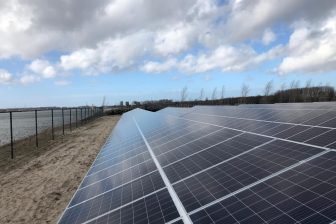G7 bereiken akkoord over klimaat en energie
9 juni 2015 – De leiders van de G7, de zeven grootste industrielanden, zijn bereid bindende klimaatafspraken te maken. Dat maakten zij gisteren bekend in de slotverklaring na de topontmoeting in Beieren.
De leiders van Canada, Frankrijk, Duitsland, Italië, Japan, Groot-Brittannië en de Verenigde Staten toonden zich bereid bindende afspraken te maken om de opwarming van de aarde de grens van 2 graden Celsius niet te laten overschrijden.
Uit een bericht van de NOS
‘(…) Dat is bijzonder én nieuw, want de landen wilden zich tot dusver niet binden aan dat doel. Van de landen met de meeste CO2-uitstoot in de wereld zijn er vijf lid van de G7. (…)’
Uit een bericht van Europa Nu
‘(…) In de loop van deze eeuw moet er een wereldeconomie komen die geen fossiele brandstoffen meer verbruikt. Het verbruik van kolen en olie moet op zijn laatst in 2025 duidelijk worden teruggedrongen. Voor de financiering van de reductie trekt de G7 100 miljard dollar uit. (…)’
Uit een bericht van NRC
‘(…) Ook zullen ze zich houden aan het betalen van de 100 miljard dollar die jaarlijks voor arme landen beschikbaar moet komen.(…)’
Dit geld moet de gevolgen van klimaatverandering in arme landen compenseren.
Uit een bericht van de Volkskrant
‘(…) Het akkoord moet een opmaat zijn voor de VN-klimaattop in Parijs die eind dit jaar plaatsvindt. Daar zal ook China aan meedoen. In 2050 moet de CO2-uitstoot al met 40 tot 70 procent zijn verminderd. (…)’
Reacties op het akkoord
Greenpeace reageerde positief.
Uit een bericht van Europa Nu
‘(…) “De visie van een ommekeer naar 100 procent verbruik van duurzame energie heeft duidelijk meer contouren gekregen. Met haar besluit kiest de G7 er definitief voor kolen af te zweren”, zei energie-expert Tobias Münchmeyer van Greenpeace. Greenpeace benadrukt wel dat de G7-landen nog wel moeten laten zien, hoe de reductie van de fossiele brandstoffen gaat plaatsvinden. (…)’
Ontwikkelingsorganisatie Oxfam sprak van een stap voorwaarts.
Uit een bericht van de Volkskrant
‘(…) Minder positief is Oxfam over het feit dat er nog geen financiering is gevonden voor het potje van 100 miljard dollar waarmee 400 miljoen mensen in door klimaatverandering bedreigde gebieden extra bescherming krijgen. (…)’
Het Climate Action Network Europe (CAN) waardeert de aankondiging van een einde aan het verbruik van fossiele brandstoffen, aldus Nu.nl. En president Jim Kim van de Wereldbank laat weten de verklaring een ‘krachtig statement’ te vinden.
Ook verzekeraars hadden aangedrongen op de klimaatafspraken, zo meldt RTLZ.
Uit een bericht van RTLZ
‘(…) Zij vrezen steeds meer te moeten betalen bij rampen die het gevolg zijn van de opwarming. Zij hebben berekend dat die schade tot 400 miljard euro kan oplopen. (…)’
Klimaatafspraken G7
De klimaatafspraken in de ‘Leaders’ Declaration G7 Summit’
‘(…) Urgent and concrete action is needed to address climate change, as set out in the IPCC’s Fifth Assessment Report. We affirm our strong determination to adopt at the Climate Change Conference in December in Paris this year (COP21) a protocol, another legal instrument or an agreed outcome with legal force under the United Nations Framework Convention on Climate Change (UNFCCC) applicable to all parties that is ambitious, robust, inclusive and reflects evolving national circumstances.
The agreement should enhance transparency and accountability including through binding rules at its core to track progress towards achieving targets, which should promote increased ambition over time. This should enable all countries to follow a low-carbon and resilient development pathway in line with the global goal to hold the increase in global average temperature below 2 °C.
Mindful of this goal and considering the latest IPCC results, we emphasize that deep cuts in global greenhouse gas emissions are required with a decarbonisation of the global economy over the course of this century. Accordingly, as a common vision for a global goal of greenhouse gas emissions reductions we support sharing with all parties to the UNFCCC the upper end of the latest IPCC recommendation of 40 to 70 % reductions by 2050 compared to 2010 recognizing that this challenge can only be met by a global response. We commit to doing our part to achieve a low-carbon global economy in the long-term including developing and deploying innovative technologies striving for a transformation of the energy sectors by 2050 and invite all countries to join us in this endeavor. To this end we also commit to develop long term national low-carbon strategies.
The G7 welcomes the announcement or proposal of post-2020 emission targets by all its members, as well as the submission of intended nationally determined contributions (INDC) and calls upon all countries to do so well in advance of COP21. We reaffirm our strong commitment to the Copenhagen Accord to mobilizing jointly USD 100 billion a year by 2020 from a wide variety of sources, both public and private in the context of meaningful mitigation actions and transparency on implementation.
Climate finance is already flowing at higher levels. We will continue our efforts to provide and mobilize increased finance, from public and private sources, and to demonstrate that we and others are well on our way to meet the USD 100 bn goal and that we stand ready to engage proactively in the negotiations of the finance provisions of the Paris outcome. We recognize the potential of multilateral development banks (MDBs) in delivering climate finance and helping countries transition to low carbon economies. We call on MDBs to use to the fullest extent possible their balance sheets and their capacity to mobilize other partners in support of country-led programs to meet this goal. We thank the presidency for the publication of the Background Report on Long-Term Climate Finance and call for a further exchange in all relevant fora in view of COP 21.
Mobilization of private sector capital is also crucial for achieving this commitment and unlocking the required investments in low-carbon technologies as well as in
– 13 –
building resilience against the effects of climate change. To overcome existing investment barriers finance models with high mobilization effects are needed.
To this end, we will:
- a) Intensify our support particularly for vulnerable countries’ own efforts to manage climate change related disaster risk and to build resilience. We will aim to increase by up to 400 million the number of people in the most vulnerable developing countries who have access to direct or indirect insurance coverage against the negative impact of climate change related hazards by 2020 and support the development of early warning systems in the most vulnerable countries. To do so we will learn from and build on already existing risk insurance facilities such as the African Risk Capacity, the Caribbean Catastrophe Risk Insurance Facility and other efforts to develop insurance solutions and markets in vulnerable regions, including in small islands developing states, Africa, Asia and Pacific, Latin America and the Caribbean as set out in the annex.
- b) Accelerate access to renewable energy in Africa and developing countries in other regions with a view to reducing energy poverty and mobilizing substantial financial resources from private investors, development finance institutions and multilateral development banks by 2020 building on existing work and initiatives, including by the Global Innovation Lab for Climate Finance as set out in the annex.
We also reaffirm our ambition to make the Green Climate Fund fully operational in 2015 and a key institution of the future climate finance architecture.
We remain committed to the elimination of inefficient fossil fuel subsidies and encourage all countries to follow and we remain committed to continued progress in the OECD discussions on how export credits can contribute to our common goal to address climate change.
We pledge to incorporate climate mitigation and resilience considerations into our development assistance and investment decisions. We will continue our efforts to phase down hydrofluorocarbons (HFCs) and call on all Parties to the Montreal Protocol to negotiate an amendment this year to phase down HFCs and on donors to assist developing countries in its implementation.
In order to incentivize investments towards low-carbon growth opportunities we commit to the long-term objective of applying effective policies and actions throughout the global economy, including carbon market-based and regulatory instruments and call on other countries to join us. We are committed to establishing a platform for a strategic dialogue on these issues based on voluntary participation and in cooperation with relevant partners, including the World Bank. (…)’
Bronnen
G7 Germany, 8 juni 2015: Leaders’ Declaration G7 Summit
Europese Commissie, 8 juni 2015: G7 Summit, Schloss Elmau, Germany
NOS, 8 juni 2015: G7 bereikt akkoord over klimaat
de Volkskrant, 8 juni 2015: G7 akkoord over klimaat en sancties Rusland
NRC, 8 juni 2015: G7 herhalen afspraken over maximale stijging temperatuur
Europa Nu, 8 juni 2015: G7 wil af van fossiele brandstoffen
Nu.nl, 8 juni 2015: Milieuorganisaties reageren positief op akkoord G7 over klimaat
RTLZ, 8 juni 2015: Milieuclubs positief over klimaatvisie G7
EU Observer, 8 juni 2015: G7 leaders agree to phase out fossil fuels by the end of century



